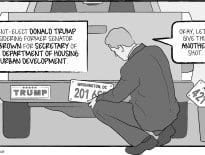As the holiday season enters full swing and the year inches closer to its close, as the real estate market slows and the snow begins to fall, professionals everywhere breathe a little easier and look forward to a new year’s dawn.
That is, assuming they aren’t inundated with invitations to galas, holiday parties, networking events and awards ceremonies. Or closing out year-end budget projections and forecasting 2017 figures. Or attempting to meet deadlines while doing all of the above and eking out a couple of minutes each day to finish last-minute shopping on Amazon and coordinating visits to and from far-flung family. Perhaps the true holiday miracle is that we all live through the season.
Theoretical relaxation aside, with just a few weeks left in the year, the holiday season is also a time to review the year that was and look ahead to the year that will be.
Though there’s still two months to go, 2016 is shaping up to be another record-breaker in the residential real estate market. Through October of 2015, 45,705 single-family homes sold in the Bay State for a median sale price of $340,000; as of Oct. 31, 2016, 50,591 homes sold at a median price of $346,000, according to The Warren Group, publisher of Banker & Tradesman.
Across the city available commercial space continues to tighten and go for increasingly astonishing figures, and the lack of supply is pushing companies into “less desirable” neighborhoods of the city and even into the suburbs.
This is not the horror most envision and does not doom a company’s growth prospects. As suburban office parks like 3rd Ave. in Burlington transform into trendy “live-work-play” spaces – and as commutes to Boston grow more arduous – those early adopters find themselves in an enviable position. “Greater Boston” grows larger every day; not every new employee is a 23-year-old willing to live with four roommates in Southie, or able to afford the rents in the Seaport.
By most accounts and from most perspectives, it’s a been a gangbuster year in Greater Boston. Unemployment is well below the national average, construction is booming, the economy is roaring – and according to a recent forum at the Boston Fed, 2017 should bring more of the same.
Realtor.com economist Jonathan Smoke told the gathered crowd of hundreds of real estate professionals that he saw no signs of a bubble in our housing market, nor did he see cause for concern in 2017. While he conceded that the rest of the country is not as strongly positioned as Boston – and has indeed there are signs of cooling in other metro markets – it’s all good news so far.
Realtors are nothing if not optimistic. Elsewhere in this issue, national correspondent Ken Harney points to tax credits likely to expire and rates likely to rise. The affordability of Boston’s housing remains a vexing issue.
The truth of what will happen in 2017 won’t be known until this time year from now. Take the season, readers, and take that breath (between all your other obligations). The news is good and the outlook bright.






